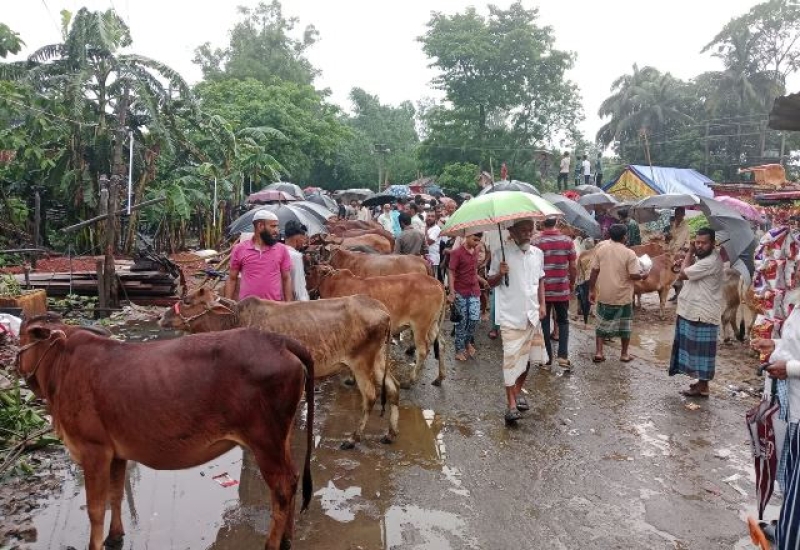- Puppet show enchants Children as Boi Mela comes alive on day 2 |
- DSCC Admin Salam’s drive to make South Dhaka a ‘clean city’ |
- 274 Taliban Dead, 55 Pakistan Troops Killed |
- Now 'open war' with Afghanistan after latest strikes |
- Dhaka's air quality fourth worst in world on Friday morning |
Customers thronge Feni cattle markets ahead of Eid

Sacrificial animal markets in Feni are attracting more buyers before the Eid
Feni, June 05 – With Eid-ul-Azha just around the corner, cattle markets across Feni are bustling with life.
From dusty village corners to pop-up haats crowding urban alleys, the district is abuzz with a familiar blend of festivity, negotiation, and expectation—each hoofbeat echoing the spirit of sacrifice and tradition.
According to district administration, this year, 112 markets have been set up across Feni’s six upazilas.
Trading officially began on May 30, and since then, the rush of buyers and sellers has only grown stronger.
Rows of cows, goats, sheep, and even buffalo are lined up, their handlers negotiating prices and the rhythmic hum of market chatter. But while supply is abundant, buyers and sellers are finding themselves on opposite ends of the price debate.
Price Dilemma
“The cost of raising cattle has gone up a lot this year,” said Fazlul Haque, a seasoned cattle farmer from Fulgazi, gently patting a sturdy brown cow. “We’ve spent more on feed, medicine, and labour. So naturally, we can’t afford to sell at lower rates.”
He isn’t alone. Farmers across the district echo the same concern. With feed prices shooting up and general inflation pressing hard, most say they’ve had to adjust their prices accordingly.
On the other side of the negotiation table, buyers like Abdul Mannan said prices have climbed well above expectations.
“A medium-sized cow is selling for Tk 80,000 to Tk 1.2 lakh,” he said while scanning a group of animals at a haat in Sonagazi. “That’s 15 to 20 per cent more than last year. A small increase is fine, but this feels a bit too steep.”
Yet, others concede the quality of the animals this year is commendable. “The locally-reared cows are strong and healthy,” said another buyer. “Given that, the prices might actually be fair.”
Stronger Supply Than Demand
According to the District Livestock Office, Feni is more than prepared to meet local demand. The requirement this year stands at 82,336 sacrificial animals, while 87,227 are already ready for sale. Of these, 69,360 are cows, 1,667 buffalo, 13,243 goats, and 3,147 sheep.
The average price of each cow is between Tk 80,000 and 5,00,000 and the price of a goat is between Tk 15,000 and 40,000. Accordingly, about Tk 1,500 crore of livestock can be sold at the greater Cumilla division market this time, according to officials’ forecast.
District Livestock Officer Md Mozammel Haque said, "There is no fear of a shortage of sacrificial animals in Feni this time. Apart from the at least 5,000 registered farmers in the district, many are privately raising one or more sacrificial animals."
The surplus isn’t new. Last year, Feni also saw supply outpace demand, even amidst a backdrop of economic uncertainty and the lingering effects of natural disasters.
Last year, the demand for sacrificial animals in the district was 87,200 while, 90,250 cattle were raised commercially and domestically.
Though devastating floods wreaked havoc across all six upazilas of Feni. A total of 35 unions were affected, resulting in the death of nearly 39,000 cows and goats and damage worth over Tk 396 crore to the district’s livestock and poultry sector, according to reports.
Push for Better Practices
As Eid draws nearer, the cattle markets are not only growing busier, they’re also becoming more organised.
Farms like Madina Agro are now offering buyers the option to purchase livestock early and house them until sacrifice day. “Customers can even use the live-weight system to determine the animal’s worth,” said Mahmudul Hasan Sabbir, the farm’s manager.
Meanwhile, district authorities have taken steps to ensure cleanliness. Each market has designated waste dumping areas, mobile cleaning teams, and a 24-hour cleanup mandate once the haats close.
“Protecting the environment is a key priority,” said Deputy Commissioner Saiful Islam. “We won’t allow Eid festivities to result in public nuisance.”
The Department of Livestock is also providing training for both professional and seasonal butchers, along with awareness programmes on hide preservation and livestock handling.
Keeping Trouble at Bay
Security is another major focus this year. From petty theft to extortion, cattle markets are known hotspots for crime. But Feni’s police say they’re prepared.
“Special teams are already active to prevent extortion, snatching, and pickpocketing,” said Feni’s Superintendent of Police Habibur Rahman. “We’re also monitoring rumours and other attempts to create artificial crises.”
To further safeguard the market ecosystem, Border Guard Bangladesh (BGB) has stepped up vigilance along the frontier to prevent illegal cross-border cattle smuggling.
“In March and April, a total of 123 Indian cows were seized from different parts of Feni’s border,” said Lt Col Mohammad Mosharraf Hossain of BGB 4 Battalion. “This year, we are determined to keep the markets clean and fair.”
Despite higher prices and recent hardships, the spirit of Eid-ul-Azha in Feni remains undeterred. The markets are full, the cows are healthy, and the hope among farmers is palpable.
“This festival is about sacrifice,” said farmer Fazlul Haque. “And for us, it’s also about resilience. We’ve given everything to raise these animals. Now, we just hope people see the value in that.”
As the district gears up for the final days before Eid, all eyes remain on the haats—where tradition, livelihood, and faith come together in a spectacle unique to the season. - UNB

